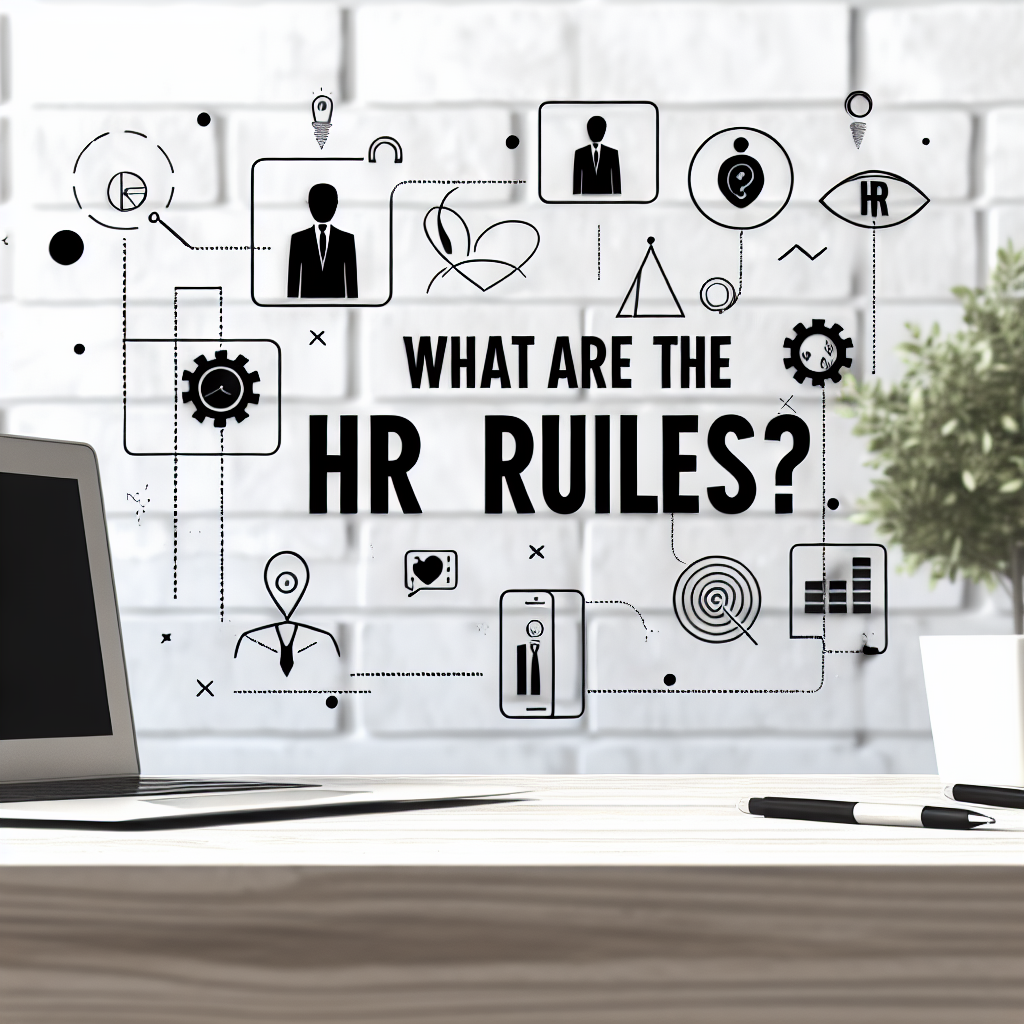
The landscape of Human Resources (HR) is always evolving, particularly as we navigate the complexities of 2024. HR rules and policies serve as essential frameworks that delineate expectations, rights, and responsibilities for both employees and employers. As matters of compliance, employee protection, and workplace culture rise to the forefront, staying up to date with these guidelines is critical. This post will delve into the significance of HR rules, current trends, and the key benefits they provide.
Understanding the Significance of HR Rules
HR rules, often articulated through well-defined policies, play an important role in maintaining a balanced and respectful work environment. Here are several key reasons why these regulations are vital:
1. Compliance with Legal Requirements
Meeting legal standards is a fundamental responsibility for any organisation. As noted in a LinkedIn article, “HR policies serve as a vital tool for safeguarding employee rights and promoting a fair and equitable work environment.” Keeping HR practices in line with the law prevents numerous issues, such as penalties and lawsuits.
2. Protecting Employee Rights
Another vital function of HR policies is to guard employee rights. Frequent reviews of these policies reflect a company’s dedication towards respecting and upholding the fundamental rights of its workforce. An updated policy framework helps cultivate a positive workplace culture which ultimately leads to higher morale and satisfaction among employees.
3. Addressing Emerging Issues
HR policies ought to reflect the current landscape of workplace challenges. This involves continually reassessing strategies to accommodate pressing matters such as cybersecurity breaches, data protection, diversity and inclusion, and mental health concerns. As highlighted in the LinkedIn article, staying proactive in policy updates equips employees with the appropriate guidelines to face new challenges effectively.
4. Mitigating Legal Risks
Failing to keep HR policies current brings about significant legal risks. Outdated regulations may lead to non-compliance issues, ultimately resulting in financial penalties and reputational damage. As mentioned in the LinkedIn article, “regularly reviewing and updating HR policies in accordance with the law helps mitigate these risks.”
5. Fostering Consistency and Transparency
Creating an environment characterised by consistency and transparency is essential for building trust. Clear HR policies ensure that employees are treated fairly and equitably. They also provide a detailed understanding of employee rights, responsibilities, and available resources, significantly enhancing the workplace environment.
6. Enhancing Employee Engagement and Retention
Updated HR policies are also linked to improved employee engagement and retention. As organisations adapt to current legislation and workplace demands, they demonstrate care and responsiveness. Aligning policies with employee expectations creates an atmosphere where individuals feel valued, leading to increased loyalty and job satisfaction.
Current Trends Transforming HR
As HR professionals continue to redefine their roles, several noteworthy trends are shaping the industry landscape:
1. Realignment of HR Priorities
The transformation of HR roles is evident, with a need to realign traditional frameworks to meet contemporary workforce demands. As stated in an article by AIHR, the role of HR is undergoing a significant transformation and must evolve accordingly.
2. The Public Nature of Employee Experience
Employee experiences have become increasingly public. Transparency in HR practices is vital to managing public perception and expectations, especially with social media platforms amplifying workplace narratives. This reality positions comprehensive communication as a cornerstone for effective HR management. As highlighted by AIHR, “HR is operating in a glass box,” necessitating careful attention to internal policies.
3. HR as a Force for Positive Change
In 2024, HR will take centre stage in driving positive change, incorporating advanced tools such as generative artificial intelligence (GAI) to refine productivity and output. The prioritisation of meaningful roles and career progression will shape organisational culture for the better, as noted in the AIHR article.
4. The Integration of AI in Workforce Operations
The rapid growth of artificial intelligence profoundly impacts various workforce dynamics. Companies are encouraged to smoothly integrate AI into everyday operations, ensuring harmonious collaboration between human and machine tasks. According to AIHR, a holistic approach to AI will be essential for long-term business success.
5. Emphasis on Diversity, Equity, and Inclusion (DEI)
DEI has solidified its place as a central focus in HR strategies. Responding to the unique needs of diverse demographics while promoting inclusivity is not just a trend; it is a necessity for modern organisational success. As highlighted by Beekeeper.io, “HR departments must address the unique needs and expectations of different demographics.”
The Advantages Offered by HR Rules
Regular updates to HR policies yield various benefits that directly impact workplace morale and efficiency:
- Legal Compliance: Keeping HR policies current not only avoids legal issues, but also mitigates financial repercussions related to non-compliance.
- Employee Protection: Discerning and regularly updated HR guidelines ensure that employee rights are upheld.
- Risk Mitigation: Staying abreast of emerging issues and relevant laws helps to reduce risks such as lawsuits and damage to the company’s reputation.
- Engagement and Retention: Consistent and transparent HR policies heighten job satisfaction and increase employee loyalty.
- Promoting Inclusivity and Equity: Effective HR policies address the need for diversity, equity, and inclusion, creating a positive environment for all employees.
Conclusion
In summary, HR rules are foundational for fostering a compliant, equitable, and engaging workplace. By staying ahead of current trends and consistently refining HR policies, organisations can effectively ensure legal compliance, enhance employee protection, mitigate risks, and cultivate a positive work culture. The proactive management of HR policies signals a commitment to employee welfare, creating an environment where both employers and employees prosper.
HR professionals must position themselves at the forefront of this evolving landscape, employing strategies that embrace change while focusing on safeguarding employee rights and promoting an inclusive workplace for all.
Vadim Kouznetsov is a distinguished entrepreneur and the visionary founder and CEO of JobXDubai.com, the UAE’s rapidly expanding job board. Renowned for his expertise in bridging the gap between job seekers and employment opportunities, Vadim has become a leading authority in the recruitment and job market of Dubai.
